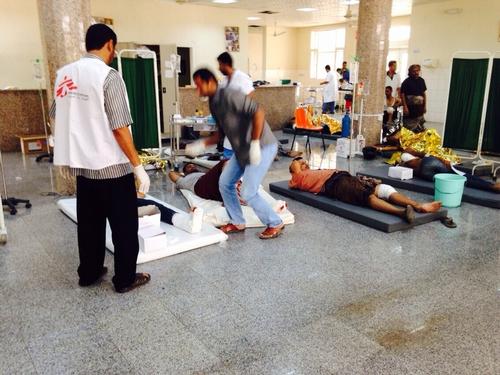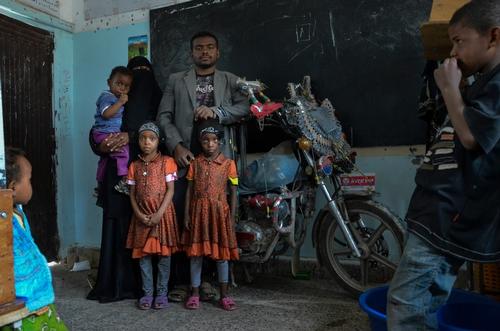In Yemen, MSF works in Aden, Al-Dhale’, Taiz, Sa’ada, Amran, Hajja, Ibb and Sana’a, and has brought 105 tons of humanitarian aid to the facilities it is running and supporting in the country.
Below is a summary of our activities in Yemen.
War wounded received by MSF: More than 3,800 injured since 19 March 2015.
Aden: MSF is running an independent Emergency Surgical Hospital within Al-Sadaqa Hospital compound in Sheikh Othman district, and has been supporting Crater Health Centre with MSF staff working 24/7 providing trauma care, medication and fuel for the power generator. The hospital includes emergency room, operating theatre, intensive care unit, surgical OPD follow up clinic, mental health services, inpatient department, physiotherapy, psychotherapy, x-ray, laboratory and pharmacy sections.
MSF has started outpatient surgical mobile clinics in Enma, As-Sha’b and Crater and provides outpatient care to surgical patients who cannot access the MSF hospital for outpatient medical care. Since the beginning of 2015, MSF received 2,380 in the emergency room and performed 2,259 surgical interventions. The number of war wounded MSF received since 19 March is more than 2,200 people.
Amran: Since mid-May, MSF has been providing general consultations in mobile clinics for IDPs who fled their homes from several Yemeni areas. More than 3,400 general consultations were provided and the activity is still ongoing. In addition, MSF has provided support in several IDPs locations. The support included providing water tanks, non-food items and hygiene kits to more than 500 IDP families located in 12 locations in Khamer. IDP support activities also included health promotion among IDPs and cleaning the sewage system in the Central Market of Khamer.
MSF is actively supporting lifesaving and healthcare services to the patients in 12 departments of the Ministry of Health (MoH) Al-Salam Hospital in the sections of emergency room, intensive care unit, surgical operations, neonatal unit, paediatrics and in-patient therapeutic centre, hospitalization, neonatal unit, delivery room, antenatal care, blood bank, laboratory, vaccination and the dressing room. MSF is also supporting Huth Health Centre with medications, oxygen, logistic equipment, human resource support, and electricity and referral system.
From 1 January to 19 June, MSF received 15,900 patients in the Emergency rooms, performed 1,370 surgeries, 1,300 deliveries, admitted 1,446 adult patients in IPD and 1,200 children in paediatric ward and neonatal unit, provided 2,534 antenatal and postnatal consultations, and 1,708 gynaecological consultations in Amran governorate.
Hajja: MSF is supporting IDPs with water, non-food items distributions and general medical consultations in Bani Hassan district. MSF has provided 4,742 general consultations in its mobile clinics and the health centre in the district.
MSF also provided emergency and life-saving services for injured in Haradh Hospital. A total of 145 war wounded were treated jointly by the MSF team and the MoH team from Haradh hospital.
Al-Dhale’: MSF is still providing life-saving healthcare services in the MoH Al-Nasser Hospital in Al-Dhale. The support includes emergency room (24/7), surgery, post-operative care, sterilization, laboratory, infection control, health care waste management and referrals.
In addition, MSF is supporting Al-Azarik Health Centre in the emergency room, ante-natal care, post-natal care, family planning, normal deliveries, EPI, nutrition and referrals to Al-Nasser Hospital. In Qataba, MSF supports the emergency room (24/7), observation room, laboratory and health care waste management in MoH Al-Salam Hospital. In the last month, MSF expanded its activities by supporting the OPD, nutrition and ANC in the hospital. MSF also provides potable water to 25,000 people through the suitable bore hole of Qataba town.
In addition, MSF is also supporting several health centers and Jaffea and Al-Habilain Hospitals with medical supplies and equipment in the governorate. Since the beginning of 2015, MSF project in Al-Dhale’ has received 10,317 patients in the emergency room and 1,232 injured among which are more than 490 war-wounded. MSF also provided general to 11,206 consultations to patients.
Sa'ada: Since mid-May, MSF has been supporting the ER, OT and maternity departments of Al Jumhuri hospital in Sa'ada town with an international and national medical team. MSF has performed 87 normal deliveries, received 837 patients in the emergency room among which 410 were war wounded and has performed 102 surgeries among which 89 were related to war. MSF is also supporting Haidan Health Centre with a doctor, medication and referral system to Al-Jumhori hospital and is planning further support for the facility.
Taiz: Since the beginning of May 2015, MSF has been providing emergency medications and surgical supplies to Al-Jumhouri, Al-Thawra, Al-Rawdah and Military hospitals that have received people affected by violence in the recent and ongoing conflict. During this period, MSF set up and equipped three extra ER rooms in Al-Rawdah hospital to allow extra space for handling mass casualties while continuing to support the hospital’s ER with supplies and staffing. MSF has 4 medical doctors and a Nurse working in the emergency room of Al-Rawdah hospital, beside covering the salaries of 22 hospital staff members who are working in the emergency rooms to ensure 24/7 presence in the ER. From beginning of June until 17 June, the hospital received a total of 617 patients, of whom 73 died. A total of 946 wounded patients were received in May 2015 alone. Currently, the average dressing in the ER is 60 patients per day. MSF also supported Al-Thawra hospital with ‘burn kits’ when about 200 people sustained burn wounds due to explosion of a petrol-tanker truck in Taiz city. MSF provides hospital-to-hospital referral system with four ambulances.
Given the assessed needs, MSF is now setting up an office in Taiz to ensure continued support during this crisis period. An MSF team is on the ground to support and carry out further needs assessments whenever necessary.
Ibb: MSF donated medical and surgical materials to Al-Thawra and Al-Qa’idah hospitals in Ibb Governorate. MSF is also considering one-off donations of food supply to centralized kitchens of IDPs who are based in five schools in Al-Qa’idah city in Ibb Governorate. On 1 June 2015, MSF helped the Ministry of Health with evacuation of 509,800 vaccine doses meant for routine immunization, from the Governorate Health office, which is at the war front-line for relocated to Ibb cold-chain.
Sana'a: MSF donated 500 dialysis session materials to the Kidney Centre in Al-Jumhori Hospital in Sana’a which will cover the registered patients for 17 days. MSF is preparing to support this centre with these materials for three months. MSF also donated 1,000 litres of diesel fuel to the oxygen factory to produce oxygen for Al-Thawra hospital. MSF is currently trying to help in the transportation of materials for Al Thawra dialysis centre and for other centres in the country.
In addition, MSF has provided urgent support during emergencies to local hospitals through the MoH following several blasts in Sana’a since the beginning of 2015.






